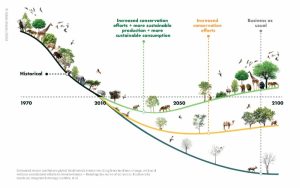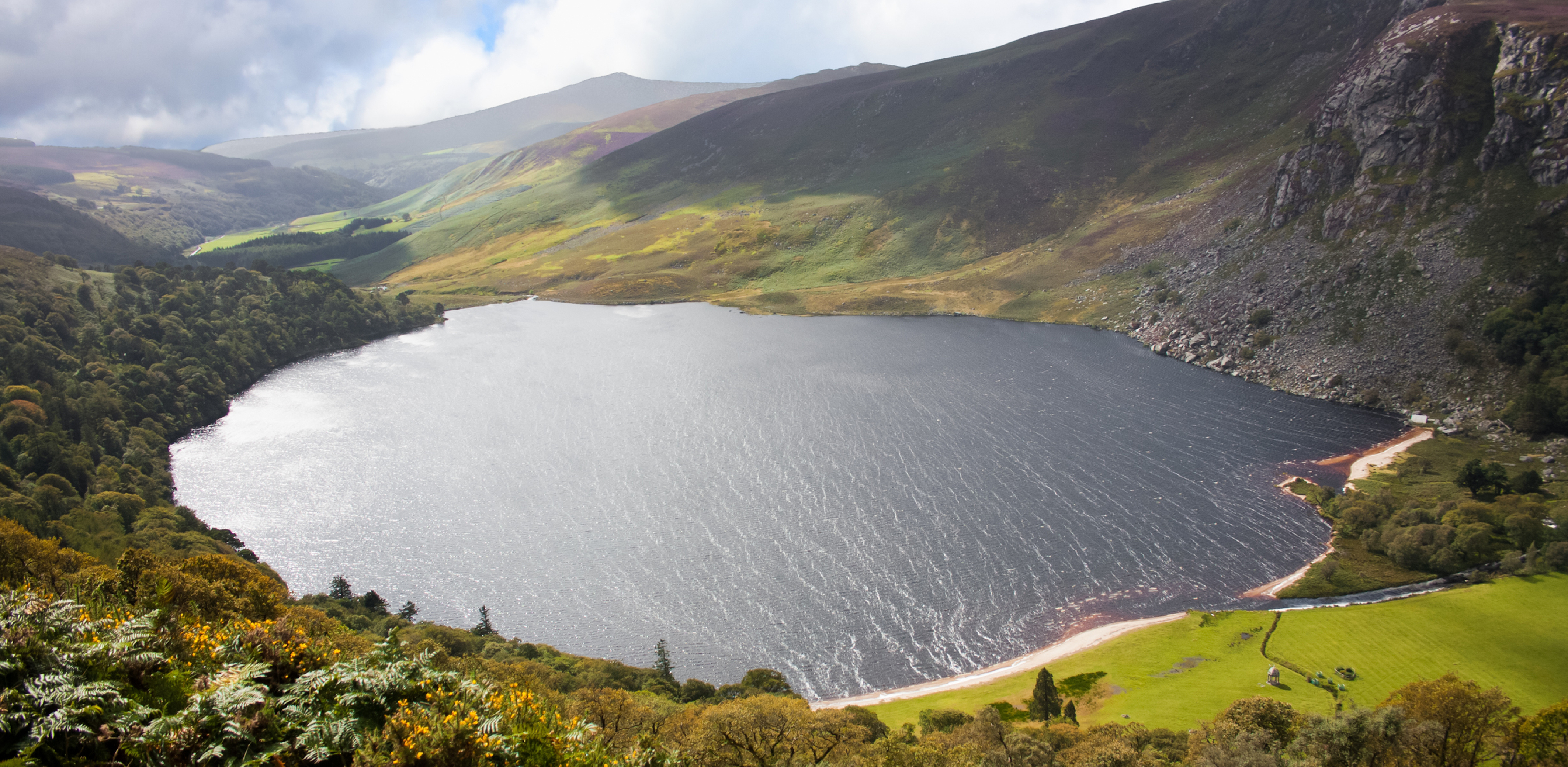Ecology and Economy: The Journey to Nature Positive – Lucy Gaffney
This blog has been written in conjunction with CIEEM’s upcoming Irish Conference: Delivering a Nature Positive Ireland.
We are on the brink of the next revolution, the “real” Green Revolution and its emergence signals the end of the ecocidal industrial revolution of the 1800s. For the first time in human history, we are waking up to the notion that healthy ecosystems are the foundation on which we have built our civilisations.
Nature is the great provider. People have become wealthier, we’re living longer and we have the best standard of living that has ever been. But while that curve is on the upswing, there is another curve that is plummeting at an alarming rate – the richness and health of the planet.

Image credit: Bending the curve of terrestrial biodiversity needs an integrated strategy | Nature
We are here because we have burned through the planets natural resources with reckless abandon, without assuring that these resources were replenished, without stewardship, without regard to other living beings and indigenous peoples.
But the tide is turning. The business world is waking up to the reality that without investment and stewardship of the natural world, their business is at risk, the economy is at risk and society, as we know it, is at risk.
First Steps
So how can businesses realistically start mobilising for nature? The truth is, that nature is the bigger picture. Our destruction of the natural world undermines the planet’s ability to process excess carbon and greenhouse gases, and our excessive greenhouse gas emissions which cause planetary warming and ocean acidification, perpetuates the loss of biodiversity and interrupts natural cycles.
The first step is really understanding that climate change and biodiversity are two sides of the same coin and absolutely need to be tackled together.
Climate or Biodiversity?
The Intergovernmental Science Policy Platform for Biodiversity and Ecosystem Services (IPBES) has identified five key industrial drivers of biodiversity loss.
- Pollution; solid, liquid and gaseous waste
- Invasive Species; non-native plant and animal species
- Ecosystem conversion; changing how we use our land and seas
- Climate Change; planetary warming, forest fires, ocean acidification
- Exploitation of natural resources
Many businesses are already planning or implementing sustainability projects and many of those projects are less to do with climate change and more to do with nature. Take single use plastics for example, yes they are made from petrochemicals, but the main reason we are ditching single-use plastics is to reduce pollution, a driver of biodiversity loss. There are of course cross-cutting benefits to eliminating single-use plastic, but pollution reduction is the most impactful.
Water stewardship is another corporate initiative that has a greater positive impact on biodiversity than climate change. Conserving water in areas that experience water stress has a high impact, not just on local flora and fauna but also on communities. As the summer temperatures rise, water stress is becoming a bigger issue, even in countries like Ireland. How many companies or services would grind to a halt if there was a prolonged drought?
Reframing our sustainability portfolio through the biodiversity lens might uncover that we are doing more for biodiversity than we first imagined.
Impacts and Dependencies
Every business depends on nature, whether directly or through its value chain. Understanding these dependencies on nature has the potential to expose hidden risks to your business and its future continuity.
Similarly, every organisation has an ecological impact. Whether it be through pollution, greenhouse gas emissions or buying palm oil for your products, some part of the natural world is being degraded. In order to develop a meaningful biodiversity strategy, businesses must understand these impacts and dependencies. There is no point in planting trees or wildflowers to tick the biodiversity action box, if a core activity in your business is responsible for deforestation somewhere else. That’s not nature positive.
There is a multitude of tools and frameworks available to help businesses, particularly corporates, understand their impacts but they can be quite technical and overwhelming for a lay person to navigate. In simple terms, a business could list core activities and explore how those activities might put pressure on those previously mentioned “drivers of biodiversity loss”. How can your business reduce that pressure? Through better recycling policies? By understanding where your raw materials come from? It doesn’t have to be complicated, any positive action is better than inaction, but it should be evidence-based.
The Role of the Consumer
It has long been my view that businesses need guidance and regulation to get to grips with these issues. But in parallel, there needs to be a shift in consumer sentiment and purchasing behaviour. We need to act quickly to avoid going over 1.5C in planetary warming and to halt nature loss, and the key to quick action is a change in consumer demand. It is happening, but there is still a lack of understanding of the issues in the mainstream. Do the public understand that buying products with palm oil, palm fat, palm kernels is causing deforestation in a tropical rainforest? Palm fat is in chocolate, peanut butter, stock cubes, most processed food, toothpaste, makeup.. the list goes on!
We need better labelling on products so that we, as consumers, can make more informed decisions and catalyse change from the ground up.
Into the future
In the next decade, “the competitive edge” will be redefined. The next great green revolution is coming and if business doesn’t evolve, then extinction is on the cards.
Lucy will be speaking at our upcoming Irish Conference: Delivering a Nature Positive Ireland.
Lucy Gaffney
Since 2021, Lucy has been leading the development of a national business and biodiversity platform, an initiative funded by the NPWS and DAFM, that will help businesses develop meaningful biodiversity strategies and ultimately help Ireland transition to a nature-positive way of working.
In 2021, she also established Wild Plan, a private consultancy which aims to provide support to businesses on their journey to nature-positive.
In 2023 she was named as one of the Irish Times 50 people to watch for her work on business and biodiversity.
Blog posts on the CIEEM website are the views and opinions of the author(s) credited. They do not necessarily represent the views or position of CIEEM. The CIEEM blog is intended to be a space in which we publish thought-provoking and discussion-stimulating articles. If you’d like to write a blog sharing your own experiences or views, we’d love to hear from you at SophieLowe@cieem.net.
